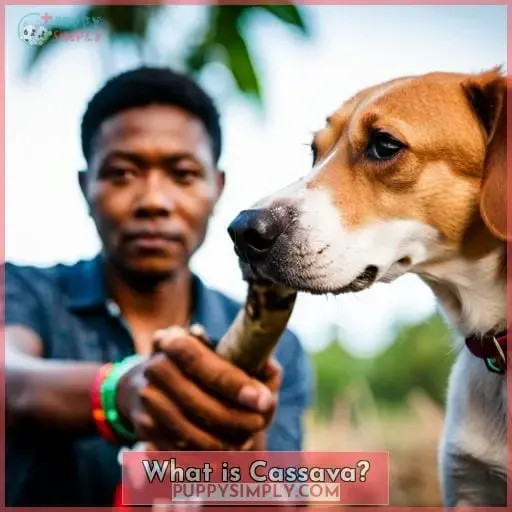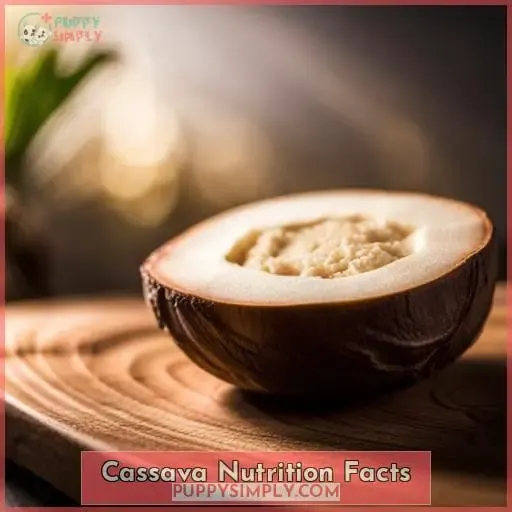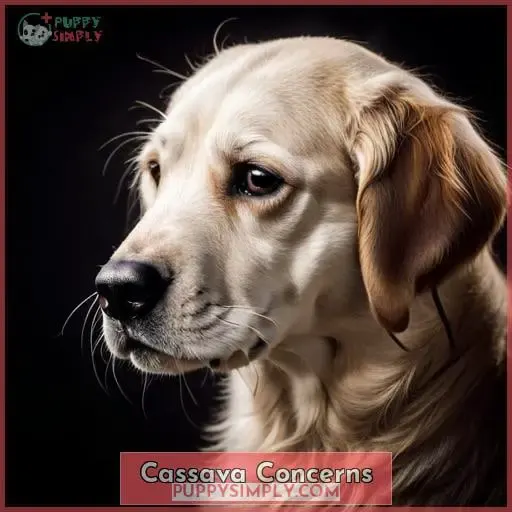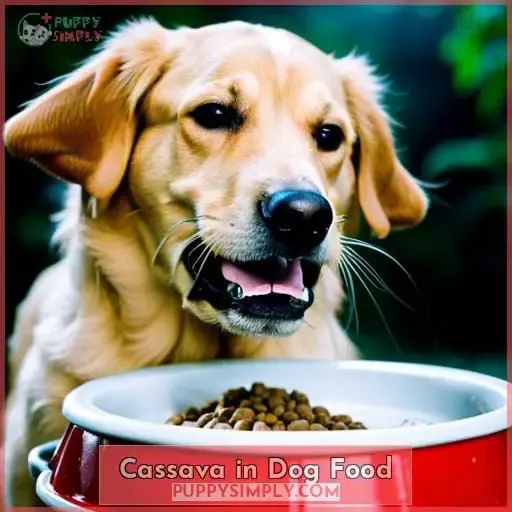This site is supported by our readers. We may earn a commission, at no cost to you, if you purchase through links.
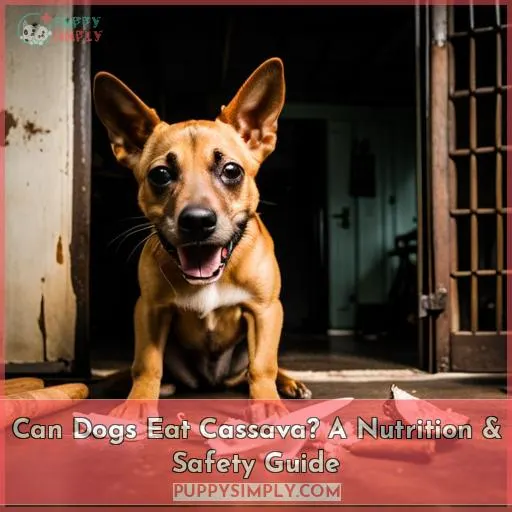 Are you wondering if your dog can enjoy the benefits of cassava? The short answer is yes, dogs can eat cassava – also known as yuca or manioc. But before adding it to their diet, there are some things you should consider about this starchy root vegetable.
Are you wondering if your dog can enjoy the benefits of cassava? The short answer is yes, dogs can eat cassava – also known as yuca or manioc. But before adding it to their diet, there are some things you should consider about this starchy root vegetable.
Native to South America and closely related to sweet potatoes, cassava provides a good source of carbohydrates and calories with a nutty flavor that many dogs love. It’s important for us pet owners to determine its nutritional value and safety in order to ensure our furry friends receive all the health benefits without any potential risks.
Keep reading for an overview on how feeding Cassava can contribute positively towards your pup’s nourishment!
Table Of Contents
Key Takeaways
- Cassava is a starchy root vegetable that can provide carbohydrates, fiber, vitamins, and minerals to dogs if prepared properly.
- Raw cassava contains cyanide and must be fully cooked to avoid poisoning dogs.
- Cassava can be a good occasional treat for dogs, promoting gut bacteria, fighting inflammation, and providing vitamin C for skin and coat health.
- It is important to consult with a vet before introducing cassava into a dog’s diet, limit portions to avoid weight gain, and be cautious of potential interactions with other foods or medications.
What is Cassava?
You may have heard of cassava before, but unless you’ve cooked it for your pup, you might be wondering what exactly this root vegetable is and how it can benefit them. Cassava is a starchy root vegetable native to South America that’s related to sweet potatoes.
It has numerous health benefits such as promoting gut bacteria growth and fighting inflammation. Additionally, it provides carbohydrates, calories, fiber, vitamins, and minerals when prepared correctly.
Though safe for dogs if fully cooked according to feeding guidelines, like washing, peeling, chopping, then steaming or boiling the pieces beforehand. Raw cassava contains cyanide, which can poison them, so it must be avoided at all costs! Despite its high caloric content making it better suited as an occasional treat than a primary food source, its nutritional profile makes it great as an ingredient in grain-free foods instead of gluten.
Cassava Nutrition Facts
Discover the nutritional benefits of cassava – it’s packed with essential vitamins, minerals, and fiber! Cassava root is gluten-free and cyanide-free when cooked properly. It contains a high amount of calories, as well as vitamin C, to support skin health in dogs.
Due to its dense texture, cassava flour can be used for baking treats or added to kibble recipes instead of wheat flour. To ensure safety, introduce small amounts gradually into your pet’s diet while consulting their vet first.
Be sure to wash, peel, and chop pieces before cooking them thoroughly – boiling or steaming is best for removing any remaining trace elements of cyanide from the vegetable itself.
Feeding this root veggie moderately will provide many neat benefits without running risks, so make sure you cook it correctly!
Cassava Health Benefits
Greeting pet owners! Cassava is a root vegetable that may have health benefits for your canine companion. Loaded with essential vitamins and minerals, cassava can help promote good gut bacteria, fight inflammation, boost energy levels, and regulate blood sugar levels.
Additionally, the vitamin C found in this starchy root vegetable helps to support healthy skin and coat growth.
Promotes Good Gut Bacteria
Cassava is a root treat packed with gut-friendly benefits. It promotes good bacteria, fights inflammation, and offers Vitamin C to help support skin and coat health.
Fights Inflammation
By consuming cooked cassava, you can help reduce inflammation in your canine companion. It’s rich in dietary fiber and vitamin C, which boost energy and regulate blood sugar.
Boosts Energy
Fuel your furry friend with the energizing power of cassava and watch them soar! Cassava is a great energy source for dogs, regulating their blood sugar levels. But be sure to cook it before feeding, as raw cassava contains cyanide and offers no nutritional value.
Portion sizes are important too; avoiding overfeeding can help prevent weight gain.
Improves Blood Sugar Levels
You can help your pup maintain healthy blood sugar levels by supplementing their diet with cooked cassava. It’s high in dietary fiber, aiding in blood sugar regulation and promoting digestive health. Cyanide toxicity is removed through proper preparation techniques like soaking before cooking and controlling portion size.
Promotes Healthy Skin and Coat
Vitamin C in cassava helps nourish your pup’s skin and coat, making them look healthy and vibrant. Soaking requirements reduce cyanide before feeding. Proper portion control with vitamin-rich fresh cassava can help maintain a soft, glossy coat texture.
Follow vet advice for introducing it into their diet to ensure safety and health benefits.
Cassava Concerns
It is important to consider cassava’s nutritional properties when deciding whether or not it is suitable for your dog. High in calories, cassava should be fed as an occasional treat rather than a primary food source.
Moreover, it must never be eaten raw due to its cyanogenic glycosides; instead, processed varieties can be used, but bear in mind that this may lower nutrient intake.
High in Calories
Cassava is high in calories, so it’s best to serve it as an occasional treat rather than a primary food source. Pay attention to portion size, ensure regular food safety checks, and avoid eating too much for optimal health.
Nutrient loss can occur when heavily processed, and feeding tips should be followed: cooking, soaking before cooking further reduces cyanide, refrigerating leftovers, and reheating before serving.
Not Suitable to Eat Raw
It’s important to note that cassava should never be eaten raw, as it contains toxic levels of cyanide, which can be fatal if ingested in high doses. Even after cooking, the amount of cyanide remaining can still reach up to 30% of its original concentration.
Before feeding your dog cassava, make sure you’re aware of their dietary needs and take into consideration their portion sizes and storage advice for best results.
Be mindful not only about reducing the risk associated with higher than normal cyanide levels but also regulating how much they consume on a daily basis for optimal health benefits.
Processed Cassava Can Lower Nutrient Intake
When heavily processed, cassava can reduce the nutrient intake of your pup, so make sure to use fresh whenever possible! Soaking before cooking further reduces cyanide toxicity and helps retain nutrition.
Cassava is calorie-dense and gluten-free but should only be fed in moderation as a treat.
How to Serve Cassava
Treat your pup to some delicious, nutritious cassava and watch them thrive! When preparing the root vegetable for your dog, there are a few steps you’ll need to take.
Start by washing and peeling the cassava before chopping it into pieces. Once that’s done, soak it in water overnight or dry it thoroughly.
After following the drying/soaking tips, cook portions of it using boiling or steaming methods for optimal safety precautions when feeding dogs. Finally, be sure to limit their consumption as overfeeding can cause weight gain.
Cassava in Dog Food
Adding cassava to your dog’s diet is like giving them a superfood boost – it provides an array of vitamins, minerals, and fiber that can help keep their gut healthy and coat shiny.
However, proper cooking techniques are essential for safety as cassava contains cyanide, which must be cooked away before feeding dogs. To ensure the right amount of nutrients without any risk, portion control is key when feeding treats made with this vegetable so dogs don’t overeat or become overweight due to its high-calorie content.
Make sure you wash and peel the root before chopping it into pieces, then steam or roast for best results.
With these precautions in mind, you can give your pup all the benefits of this wonderful veggie safely!
How is Cassava Good for Dogs?
Since cassava is a great source of carbohydrates, calories, and fiber, it can be an energy-boosting addition to your dog’s food. It supports healthy digestion by providing important vitamins and minerals as well.
- Feeding Tips: Follow recommended feeding guidelines to prevent weight gain in your pup. Introduce gradually in small amounts while consulting with the vet first if needed. Cooked cassava must always be refrigerated when not being served and reheated before re-serving to ensure safety for your pet.
- Health Risks: Raw cassava contains cyanide, which can poison or even kill dogs, so never feed them raw without properly preparing beforehand according to instructions given by experts only. Soak, dry, and boil fully cooked pieces until all toxins are gone before feeding them as part of meals or treats.
- Nutritional Value: Cassavas are high in calories, so they should be used sparingly rather than frequently – making sure portion size is appropriate too! They provide important nutrients such as vitamin C, which helps support skin/coat health, along with minerals like iron that help regulate blood sugar levels better.
- Digestion Aid & Energy Source: Besides helping fight inflammation due to its carotenoids content found naturally inside this root vegetable, cooked yucca also promotes gut bacteria development while giving a much-needed lasting energy boost on days spent outdoors playing fetch!
How Can I Safely Give Cassava to My Dog?
To ensure your pup enjoys all the benefits of cassava, it’s important to safely feed them cooked pieces of this root. Boiling and soaking before cooking further reduces cyanide levels up to 98%, so you can rest assured that your dog is getting a nutritious snack without any potential risks.
- Portion properly when introducing it into their diet.
- Refrigerate leftovers and reheat before re-serving.
- Soak in water for at least an hour prior to boiling or steaming, as this further reduces cyanide content.
- Wash, peel, chop, and then steam or boil cassava pieces before feeding.
- Consult a veterinarian if unsure about how much should be fed daily.
With these tips in mind, you can confidently provide your fur baby with a delicious treat full of nutrients while still being safe.
Frequently Asked Questions (FAQs)
Is Cassava Good for All Dogs?
Yes, cassava is generally good for all dogs when cooked properly. It boosts energy and supports skin and coat health, but must be fully dried and boiled to remove any cyanide before feeding.
What is the Best Way to Prepare Cassava for My Dog?
To safely prepare cassava for your pup, wash, peel, and chop, then steam, roast, or boil the pieces. Soak before cooking to further reduce cyanide. Introduce gradually in small amounts and consult a vet first.
Is Cassava Safe for Puppies?
Puppies can safely eat cooked cassava, but ensure it is thoroughly washed and prepped first. Boil, steam, or roast to reduce cyanide levels and portion properly to avoid weight gain.
Does Cassava Have Any Side Effects?
Have you ever wondered if cassava has any side effects for your pup? Cooked properly, it can be a great source of nutrients; however, raw consumption can cause cyanide poisoning and even death.
Does Cassava Have Any Interactions with Other Foods or Medications?
Cassava is safe when cooked, but it can interact with certain foods or medications. Make sure to consult your veterinarian before adding cassava to your dog’s diet. Some interactions could be dangerous and may even cause serious health problems for your pup.
Conclusion
Providing pooches with proper portions of cassava can be a safe and healthy supplement to their diets. However, it’s essential to be aware of the potential dangers and take precautions when feeding this root vegetable.
Cassava contains cyanide, so it’s not safe to eat raw. Dogs should only consume cooked cassava, which has been boiled, steamed, or roasted.
It’s also important to be mindful of the high calorie content of cassava when feeding it to your pup. When served in moderation, it can provide essential nutrients and promote gut bacteria, fight inflammation, boost energy, and regulate blood sugar.
With the proper preparation and portion control, cassava can be a nutritious treat for your pup.

